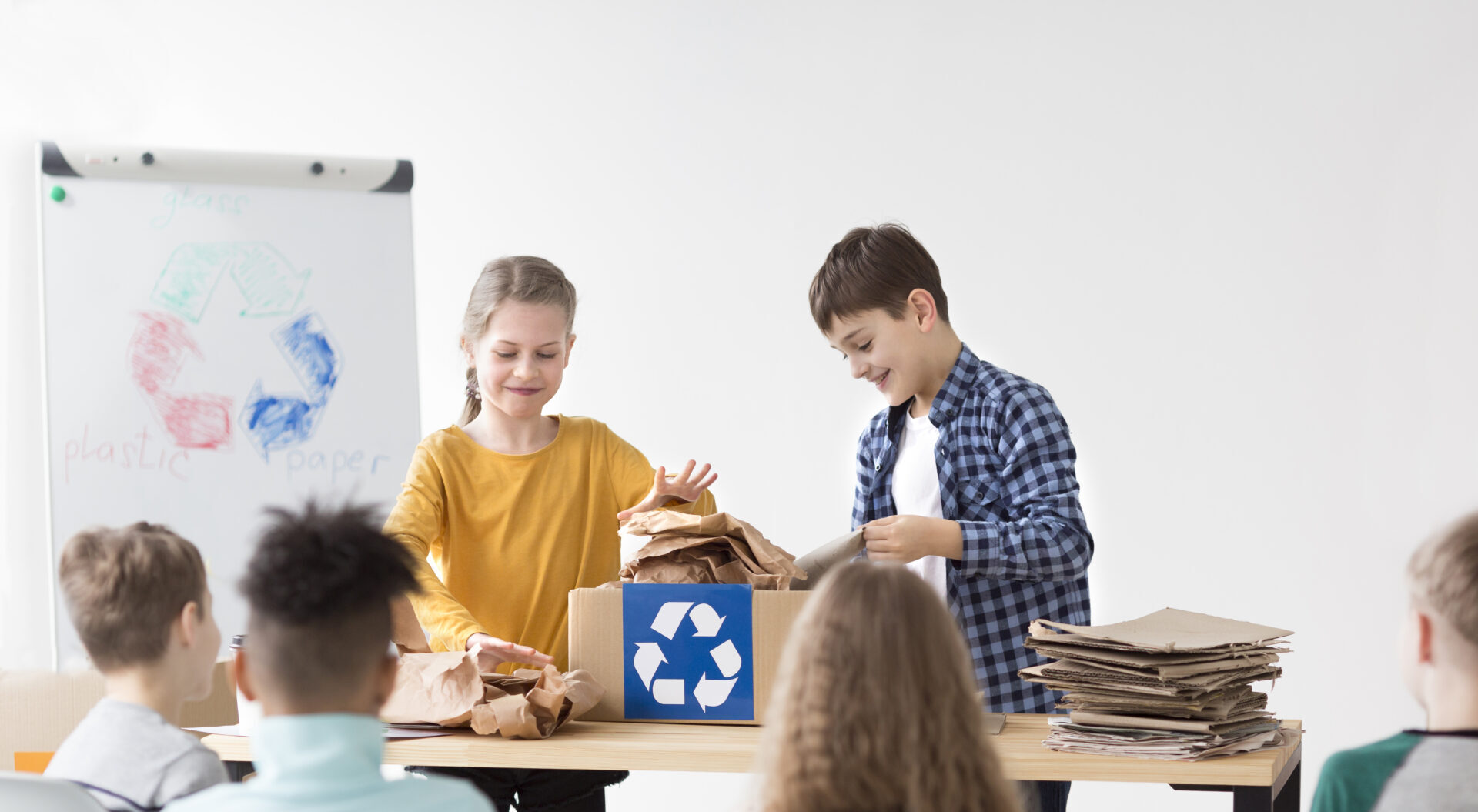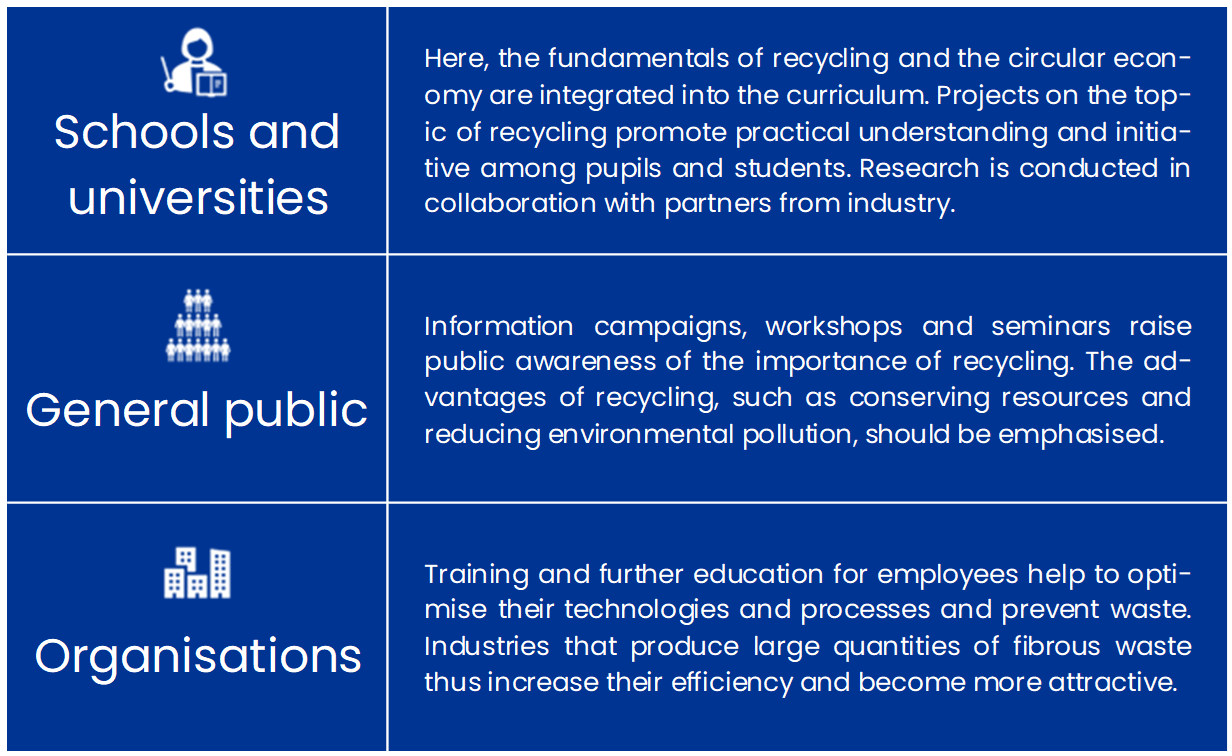
The role of education in dealing with the recycling of fibre-containing waste

The world is facing a growing challenge: dealing with the ever-increasing amounts of fibre-containing waste. Whether it’s carbon fibres from the aviation and automotive industries or the use of non-metallic reinforcements in construction, the need to recycle these valuable materials efficiently is undeniable. But how can we raise awareness and encourage the public to actively participate in these processes? The answer lies in education.
Why education is more than just knowledge
Education is much more than simply imparting facts. It is the cornerstone for a deep understanding of the complex interrelationships between waste management, resource conservation and environmental protection. Only those who understand the background can truly grasp the necessity of recycling, actively participate in it and even benefit from it. Since the acceptance of new technologies and processes is crucial for the success of the circular and resource economy, education plays a key role here [1]. It allows uncertainties and reservations about the use of new materials and their recyclability to be dispelled.
Educational initiatives for different target groups
To achieve a broad impact, educational initiatives must be tailored to different target groups. Education must reach all levels. In schools and universities, the topic of recycling fibre-containing waste can be integrated into lessons, for example through practical projects or excursions to demolition, sorting and processing plants. Information campaigns and workshops are important for the general public in order to break down prejudices and highlight the advantages of recycling. Companies, in turn, benefit from targeted training and further education in order to optimise their processes to meet new requirements and thereby open up new business areas. Education thus also contributes to increasing the attractiveness of the working environment, which in turn attracts skilled workers.

Education has an effect
A higher level of education correlates directly with a greater willingness to recycle [2]. Furthermore, it has been shown that education in the field of recycling and resource management has a positive effect on the dissemination of knowledge and on positive behaviour with regard to recycling [3, 4]. Teaching people about the whole process chain – from collection and sorting to reuse – not only makes it more acceptable, but also boosts innovation in the area. Putting education into regional alliances and networks helps develop new value chains and makes it economically viable to close material cycles [5].
Only when knowledge, practice and innovation go hand in hand can the recycling of fibre-containing waste become a real success story. Education is much more than just a tool. It is the breeding ground on which sustainable solutions grow. It empowers people to think in new ways, take responsibility and actively participate in shaping a resource-efficient future. When we invest in education, we invest in a society that not only understands the circular economy and resource management, but also lives it, thereby preserving the value of fibres and materials for future generations.
As of 2025-07-22
List of references
[1] Popescu, S., Rusu, D., Dragomir, M., Popescu, D., & Nedelcu, Șerban. (2019). Competitive Development Tools in Identifying Efficient Educational Interventions for Improving Pro-Environmental and Recycling Behavior. International Journal of Environmental Research and Public Health, 17(1), 156. https://doi.org/10.3390/ijerph17010156
[2] Pelau, C., & Chinie, A. C. (2018). Econometric Model for Measuring the Impact of the Education Level of the Population on the Recycling Rate in a Circular Economy. 20(48), 340. https://doi.org/10.24818/EA/2018/48/340
[3] Asmatulu, R., & Asmatulu, E. (2011). Importance of recycling education: A curriculum development at WSU. Journal of Material Cycles and Waste Management, 13(2), 131–138. https://doi.org/10.1007/s10163-011-0002-4
[4] Simmons, D., & Widmar, R. (1990). Motivations and Barriers to Recycling: Toward a Strategy for Public Education. The Journal of Environmental Education, 22(1), 13–18. https://doi.org/10.1080/00958964.1990.9943041
[5] Tiippana-Usvasalo, M., Pajunen, N., & Maria, H. (2023). The role of education in promoting circular economy. International Journal of Sustainable Engineering, 16(1), 92–103. https://doi.org/10.1080/19397038.2023.2210592
About the partnership
Be part of the alliance and join us in facing the challenges with regard to the no longer avoidable handling of fibre composites. Let us together lead the region “Elbe Valley Saxony” into an economically resilient future.
